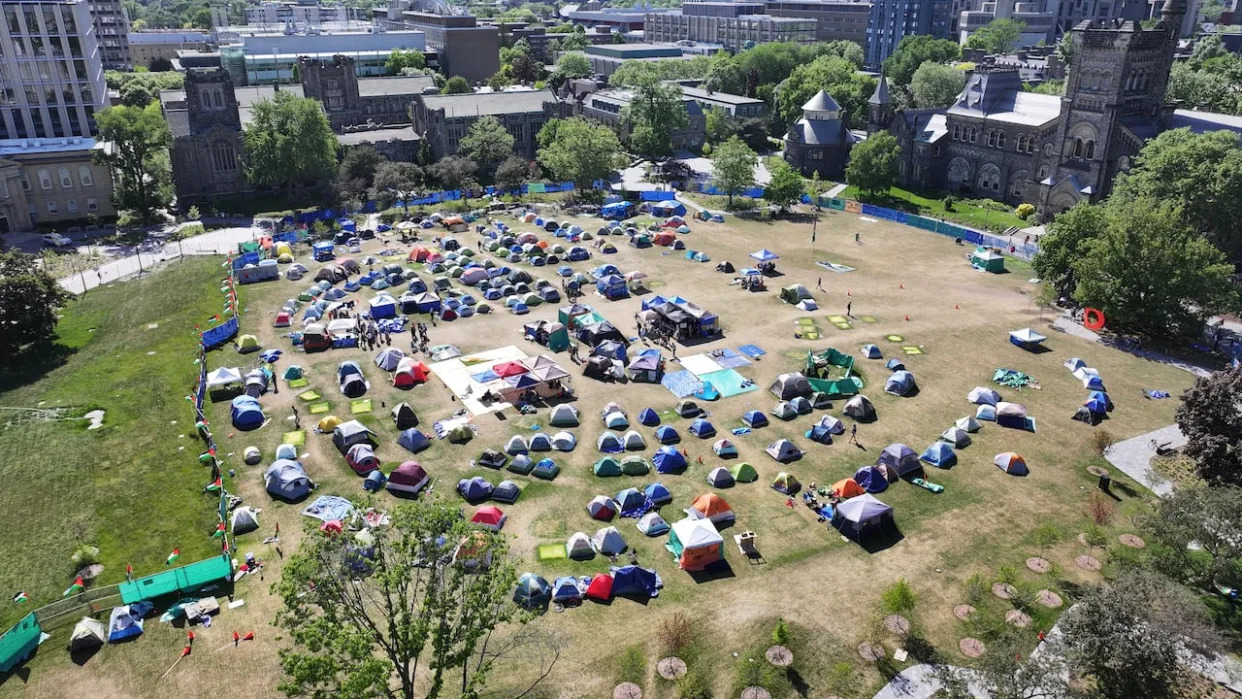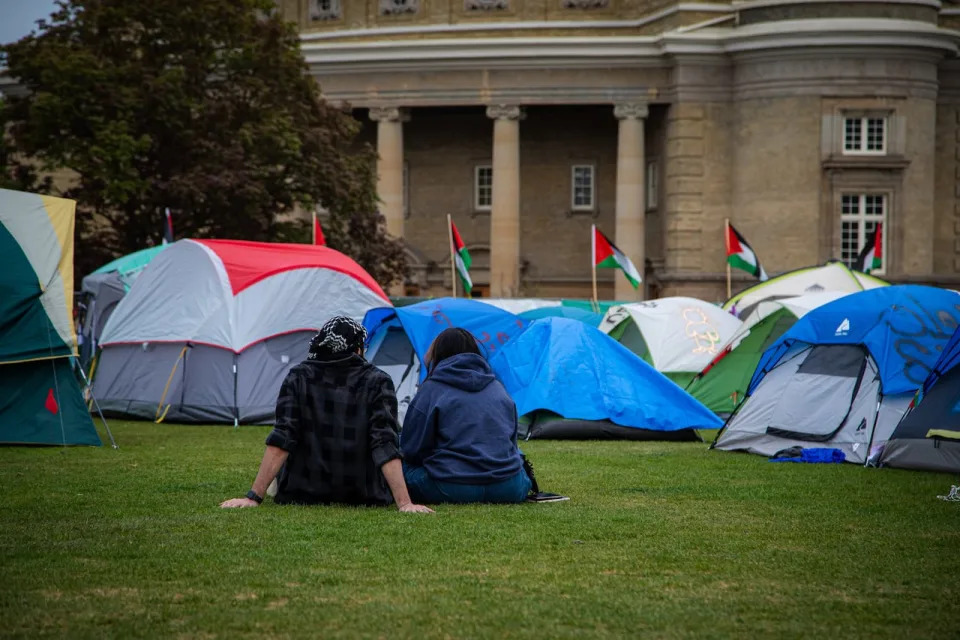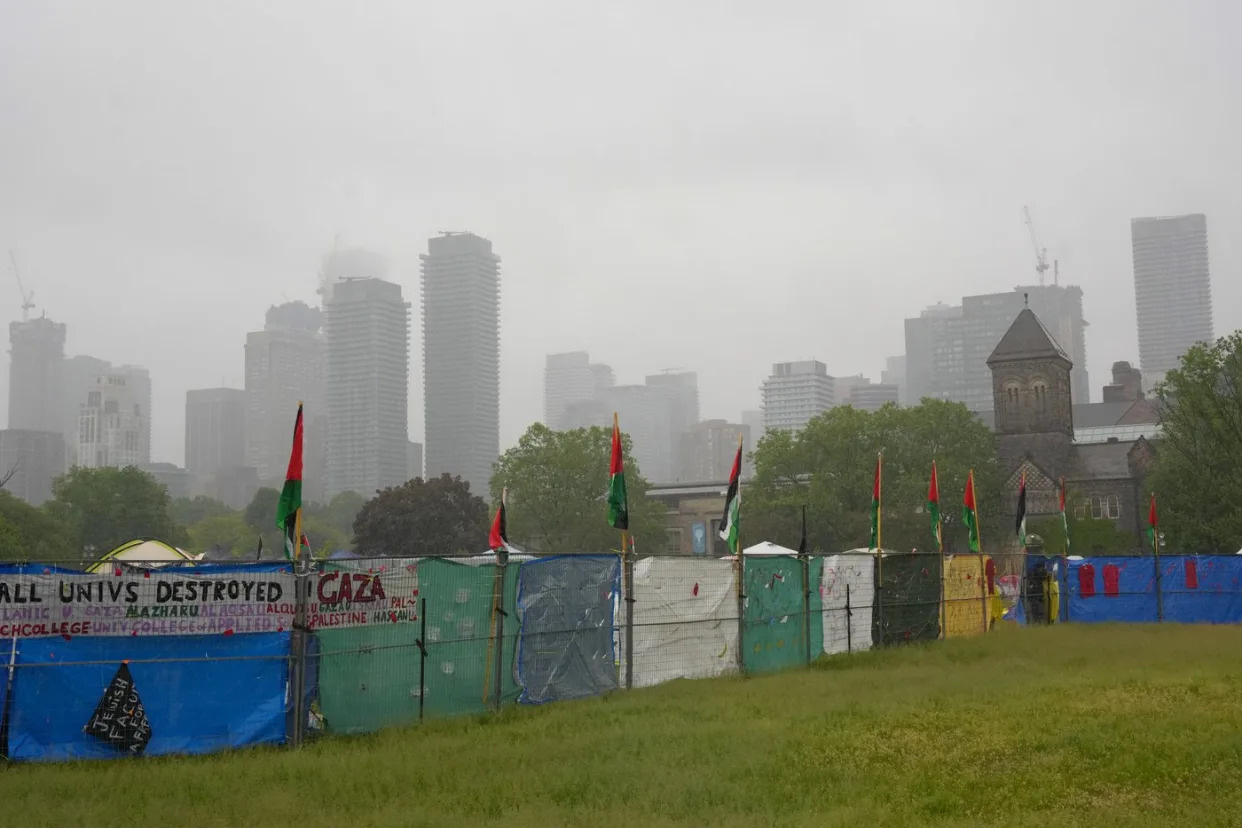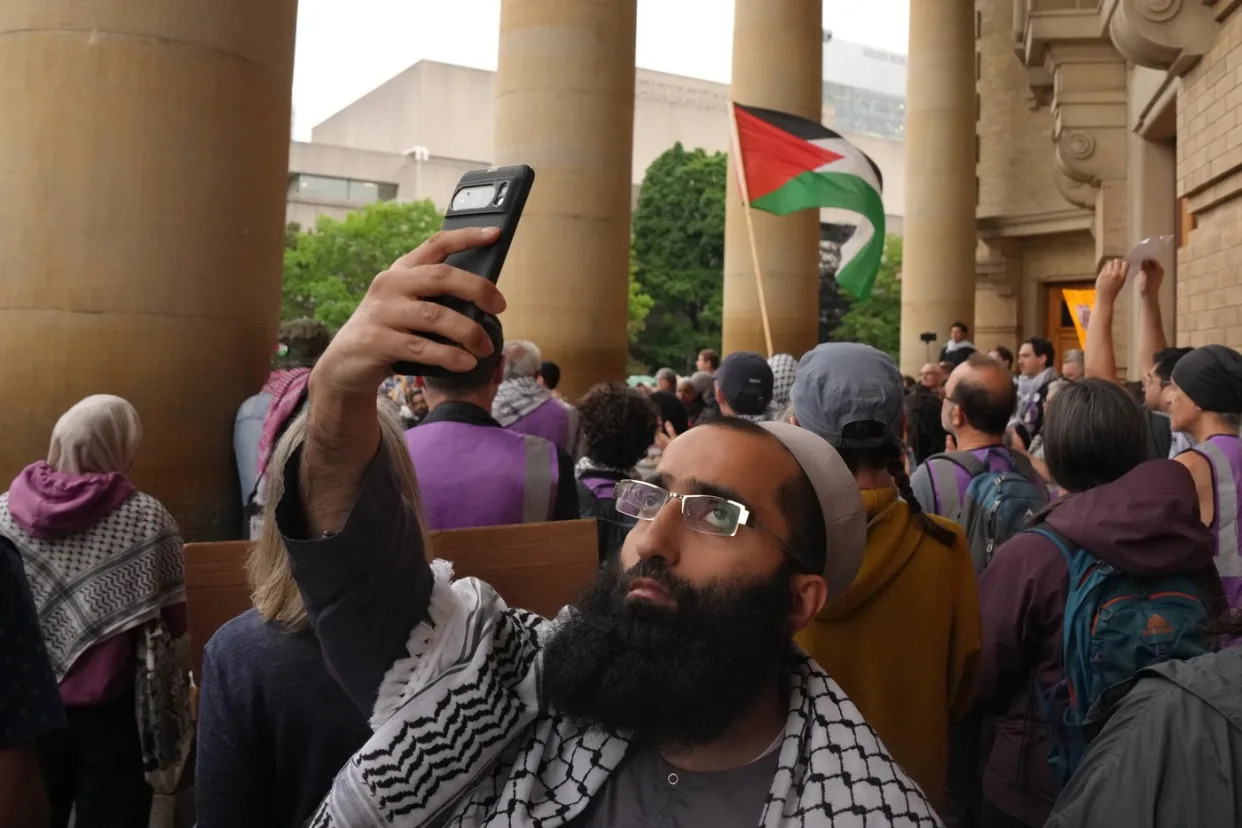CBC
Wed, May 29, 2024

A drone image of the Pro-Palestinian protest encampment at University of Toronto's King's College Circle. The image was taken after notices of trespass were issued by the university to end the encampment on Friday. (Patrick Morrell/CBC News - image credit)
The University of Toronto's request for an injunction to clear a pro-Palestinian encampment on its campus won't be heard before the start of convocation events.
Court documents show the hearing at Ontario Superior Court of Justice is set for June 19 and 20, after the scheduled start of convocation ceremonies. On its website, the school says the ceremonies will run from June 3 to 21.
In an email on Wednesday night, a spokesperson for U of T said convocation will be held as scheduled. More than 13,000 graduating students are expected to receive their degrees during the ceremonies, the school said.
"Our spring convocation ceremonies are proceeding in person as planned at Convocation Hall on our St. George Campus," the university said in a statement.
In a court document, Ontario Superior Court Justice Markus Koehnen says the court is aware that the university would like the hearing to be held sooner.
"I appreciate that those hearing dates do not accommodate the university's interest in having the issue resolved before graduation ceremonies are over. In my view, however, that is the earliest that the hearing can be held in order to afford the respondents a fair opportunity to answer the application," Koehnen writes.
A number of groups are seeking intervener status in the injunction hearing and have until end of the day Thursday to make their written submissions, the judge said.
Order sought to authorize police to end encampment
The university has asked the court to authorize police action to remove protesters who refuse orders to leave the encampment, which was set up on campus on May 2 on the grassy area of King's College Circle. The encampment is near Convocation Hall, where graduation ceremonies at U of T are traditionally held.
The school filed a notice of motion this week, aimed at bringing an end to the demonstration, saying the encampment was causing irreparable harm to the institution.
As part of the relief sought, the university is asking for an order authorizing police to "arrest and remove persons, objects and structures" who violate the terms of a court order.
It is also seeking to prevent protesters from blocking access to university property or setting up fences, tents or other structures on campus.

Two students sit on the grass at King's College Circle on Thursday, May 9, where the pro-Palestinian encampment at the University of Toronto is located. (Aloysius Wong/CBC)
On Tuesday, a handful of faculty members spoke out against the university's actions, saying they are appalled at the idea of the school administration calling the police on its own students.
On Friday, the university issued trespass notices to people in the encampment that said the protest was unlawful and they had until Monday morning to leave. The students in the encampment defied the notice.
Encampment organizers have called on the university to cut its ties with Israel, divest from companies profiting from Israel's offensive in Gaza and terminate partnerships with the country's academic institutions deemed complicit in the war.
School administrators have already said U of T will not end any partnerships with Israeli universities, and that no matter the outcome of the negotiations, demonstrators must vacate the school's St. George campus.
On Oct. 7, Hamas and other militants attacked southern Israel, killing around 1,200 people and taking more than 250 people hostage, according to Israeli tallies. More than 100 were released during a November cease-fire in exchange for Palestinians imprisoned by Israel.
Israel's offensive in Gaza against Hamas has killed more than 36,000 Palestinians, according to the local health ministry.
The Canadian Press
Wed, May 29, 2024

TORONTO — The University of Toronto's request for a court order to clear a pro-Palestinian encampment on its downtown campus is expected to be heard in three weeks.
Ontario Superior Court Justice Markus Koehnen has set a timetable that lists June 19 and 20 as the injunction hearing dates.
The judge acknowledges in a court filing that those dates "do not accommodate" the university's interest in resolving the issue before convocation ceremonies begin in early June but he says a fair opportunity must be given to the respondents to make their case.
The university wants to end the encampment that was set up on May 2 and is asking the courts to authorize police action to remove protesters who refuse orders to leave.
The university is arguing that the encampment prevents others from accessing and enjoying school property, poses health and safety risks and has prompted numerous reports of harassment, hateful speech and violence – claims denied by protest organizers.
The protesters are challenging the injunction request and have refused to leave the site, ignoring a trespass notice issued last week.
In a court document filed Wednesday, the judge said there is an urgency to the university's injunction request because the encampment on a grassy area known as King's College Circle is adjacent to Convocation Hall, where graduation ceremonies are held.
But he said it's his view that June 19 and 20 is the earliest an injunction hearing can be held "in order to afford the respondents a fair opportunity to answer the application."
The university has scheduled convocations from June 3 to 21.
Protesters have said that they don't see how their presence at King's College Circle would disrupt convocations at the downtown campus. University president Meric Gertler has stressed that graduation ceremonies would proceed "no matter what."
A number of groups are seeking intervener status in the injunction hearing and they have until end of the day Thursday to make their written submissions, the judge said.
Since filing its motion, U of T has submitted affidavits to the court from its assistant director of campus safety, students, faculty members "and the wider community about their experiences with the encampment."
The school says the injunction is necessary “to restore the university’s ability to preserve the space as an open, free and public atmosphere for respectful discourse and debate.”
Demonstrators have said they will stay put until the university meets their demands, which include disclosing investments in companies profiting from Israel's offensive in Gaza.
Similar encampments on university campuses have cropped up across Canada in recent months, with several schools considering or taking legal action against the protesters.
This report by The Canadian Press was first published May 29, 2024.
The Canadian Press
U of T seeks court injunction to clear encampment as protesters stay put
The Canadian Press
Tue, May 28, 2024

Protesters at a pro-Palestinian encampment at the University of Toronto said Tuesday they will stay at the site despite threats of discipline from the school and a looming legal action.
Protesters reaffirmed their commitment to the encampment as the university seeks expedited court scheduling for its request for an injunction.
"Having been threatened by the university with academic sanctions, including suspension and expulsion, having been threatened with arrest and police violence — despite all of this, despite all these threats being made, we remain," said Erin Mackey, one of the encampment organizers.
"We've been clear from the very beginning that by virtue of being here, it does not warrant the University of Toronto calling the police on their own students," she added.
Deborah Cowen, a professor at the university who came to support the protesters, said she was "deeply, deeply disappointed" by the administration's decision to seek an injunction to dismantle the encampment.
"I'm outraged by our administration's actions," she said, pointing to what she called an "unprecedented" and "egregious" threat of mass termination and other forms of discipline.
"And that comes when we haven't seen a serious good faith effort at negotiation,” she said.
The University of Toronto is asking the courts to authorize police action to remove protesters who refuse orders to leave the encampment, which was set up on campus earlier this month.
The university has filed a notice of motion in court aimed at bringing about an end to the demonstration while saying the encampment was causing irreparable harm to the institution.
Among the relief sought, the university is asking for an order authorizing police to "arrest and remove persons, objects and structures" who violate the terms of a court order.
It is also seeking to prevent protesters from blocking access to university property or setting up fences, tents or other structures on campus.
The protesters have said they are prepared to fight back with their own legal team and refused to leave the site, ignoring a Monday morning deadline set in a trespass notice issued last week.
Richard Moon, a University of Windsor law professor whose areas of expertise include freedom of expression, said injunction requests before the courts have to be decided "on a kind of balance of probabilities," taking into account the interests and rights of both parties.
"On one side is: what are the harms to the university and the members of the university community ... that stem from this encampment and its continuation, and on the other side: what would the injury be to those engaging in the encampment – their speech interests – if the encampment was shut down?" he said in a phone interview Tuesday.
Moon said that, in his view, U of T's court filing does not "clearly demonstrate" that antisemitic hate speech has been coming from the encampment itself, or that protesters are blocking entry to buildings or restricting other people's movements across the campus.
The university said in its court filing that it has received "many concerning reports" about violence, property damage and discriminatory speech "within and surrounding the encampment area."
It said areas around the encampment have had reports of confrontations between protesters and counter-protesters, as well as antisemitic slurs, among other things.
Moon said a recent court decision to grant Université du Québec à Montréal a partial injunction against pro-Palestinian protesters who set up an encampment on that campus shows that such court orders can be limited and still allow people to protest.
A Quebec judge ruled Monday that safety measures such as removing obstructions and allowing the fire department to visit the camp to make sure it's safe need to be put in place, and that doing so won't infringe on the encampment members' right to protest.
"It is possible to issue an injunction that is limited in scope and addresses particular issues of that kind," Moon said. "It doesn't involve shutting down the entire encampment."
A court date to hear U of T's injunction request has yet to be set. A number of groups sought intervener status in the matter during a case conference on Tuesday, with the judge now set to consider those submissions.
Sohail Adish, a U of T student not involved in the protest, said he has mixed feelings on the encampment and on the university's response.
"I feel like they're in their right to protest as long as it's peaceful and the university is in their right to allow or disallow people on the campus," he said.
"As for students getting expelled, staff getting fired, I'd say, it really depends on what kind of actions they commit."
Adish said he had concerns for the safety of the encampment, particularly when it came to fire safety.
Similar encampments on university campuses have cropped up across Canada in recent months, with several schools considering or taking legal action against the protesters.
This report by The Canadian Press was first published May 28, 2024.
No comments:
Post a Comment